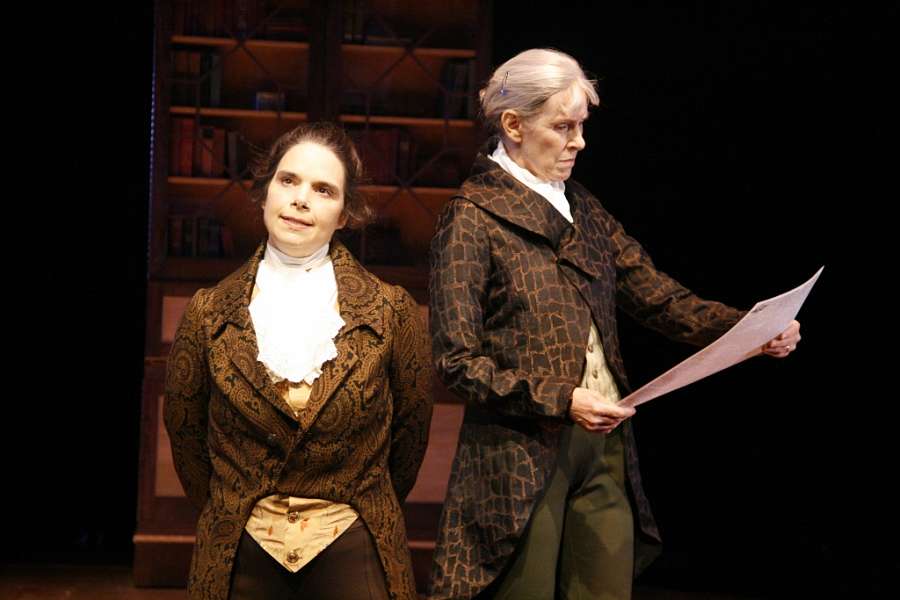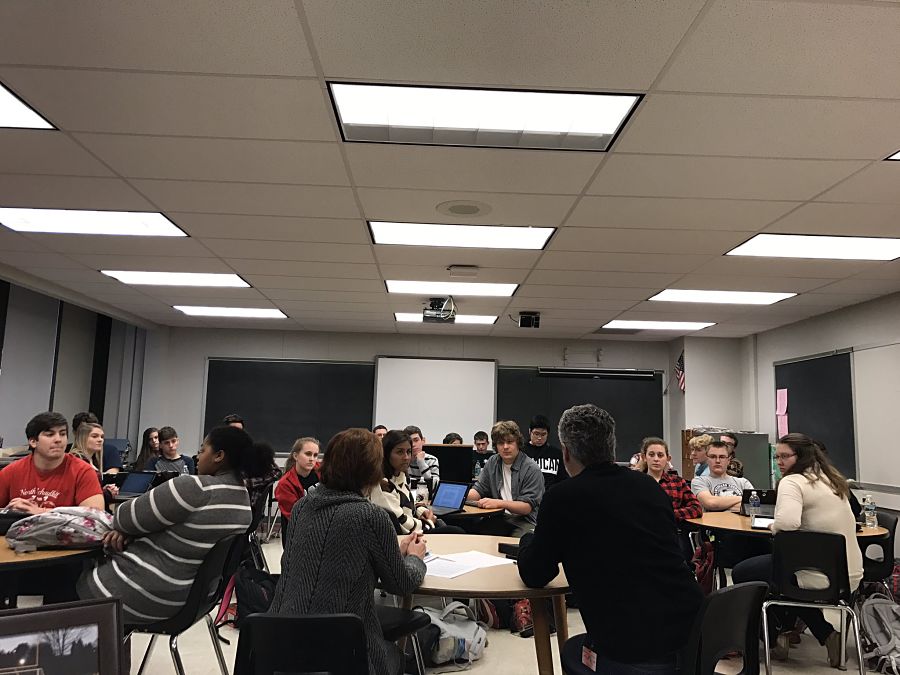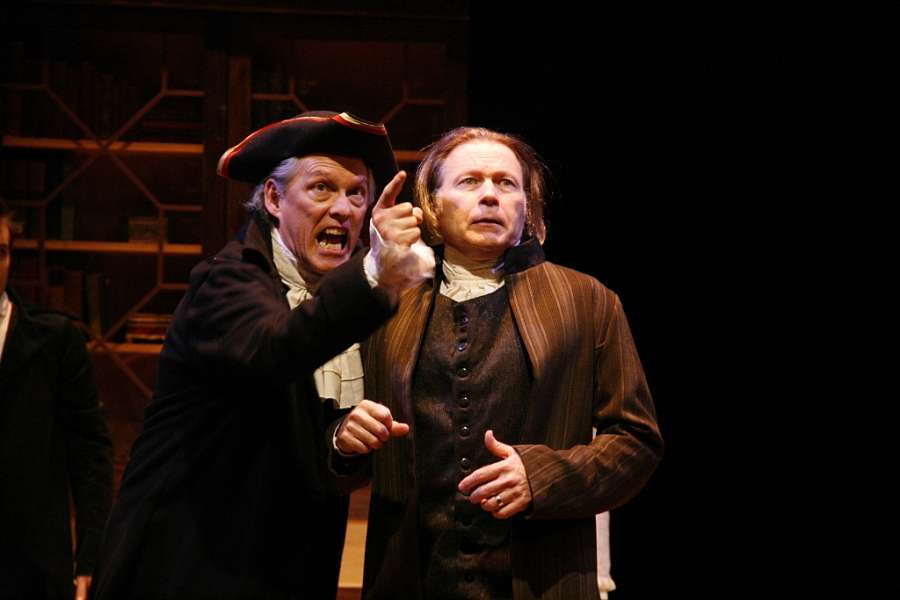Bloomsburg, Pa., is a river town, a former textile town, remaking itself as the home to a small university and a regional health center. The front page of its daily newspaper features high school athletics and crimes associated with meth and opioids; letters to the editor read like angry white people talking among themselves.
For nearly 40 years, Bloomsburg has also made a home for Bloomsburg Theatre Ensemble, a professional theatre company that stages, in a 300 seat-theatre in the heart of town, seasons of recent plays, classics, company-created works, and a goofy holiday show, as well as original school tours and venturesome performance series. An ensemble member can’t walk down Main Street without stopping to talk with neighbors and merchants about upcoming community events or the company’s latest production. The ensemble chooses their seasons collectively and run their company cooperatively, along with a small administrative staff.
But in all their years of existence, BTE had never commissioned an outside writer. So it was with their characteristic blend of daring and strategic planning that they invited me to join them for the years-long process of writing them a world premiere.
When it was finally done, we found ourselves opening on the weekend of the presidential inauguration and the nationwide marches of resistance. And that turned out to be an experience that confirmed why we do this work and why our communities continue to value it.
In Gunpowder Joe, a political and religious refugee tries to find a safe haven in a fiercely divided America where an increasingly authoritarian administration is feeding xenophobia and fear of foreign terror to stay in power, while a permanent underclass is systematically denied its rights. Politicians pay journalists to write hit pieces on each other. The president is prone to rages and obsessed with his public image.
The play opens in 1794.
Dr. Joseph Priestley was a radical thinker, a towering figure of the Enlightenment, the discoverer of oxygen and carbonation, a founder of Unitarianism, a protégé of Benjamin Franklin, and a writer on revolution who inspired our Founders. When mob violence forced him from his native England, he and his family settled into an uneasy retirement on the banks of the Susquehanna River, a few miles downstream from Bloomsburg. Both John Adams and Thomas Jefferson counted him as a friend and inspiration. When they turned on each other, Priestley was caught between them.
BTE believes that some of their work should tell local stories with national themes, and Joseph Priestley qualifies. So Laurie McCants, one of the founders of BTE, approached me with the idea of writing a play about him for BTE to perform.
With a life as large as Priestley’s the challenge is to find which stories to tell. When you’re writing for what is in effect a group of eight artistic directors, the added challenge is to balance a lot of agendas while making a play with a voice of its own. BTE’s ensemble are all extraordinary actors, and writing meaty roles for them was one of the great attractions of the project. Their aesthetic interests range from Noh performance to Egyptian street puppetry. But they make no bones about the fact that they make their lives in this community and that their work must both please and challenge their audience if their company is to survive. Buses full of high school students will be coming.
Another set of collaborators was the characters themselves. Every one of the major characters has been the subject of at least one full-length biography. Many volumes of their writings survive. As much as possible, the script had to include their own words and their ideas as I understood them. But the greatest challenge was to try to find the voices for the characters whose voices had been lost or silenced: Mary Priestley, Sally Hemings. That meant consulting with people who have devoted their careers to bringing lives like theirs into the light again.

And oh, the places we went. We prowled Joseph Priestley’s beautifully preserved home and laboratory and scoured museums in Philadelphia. Penn State houses an archive of Priestley materials. If you read Priestley’s manuscript of his memoirs, you see that every time he gets to Benjamin Franklin’s name, his handwriting gets bigger. His pride and admiration are clear. Though Franklin was dead by the time our play begins, the action had to include him somehow.
The Newseum in Washington, D.C., holds originals of the vitriolic newspapers—the Philadelphia Aurora, Porcupine’s Gazette—that provided much of the play’s acerbic narration. Laurie visited Priestley’s native Yorkshire and made recordings that helped our Priestley, James Goode, find his character’s voice. At the Adams family’s home, Peace field, a National Park Service guide talked about Abigail Adams’s upbringing in a slave-owning family. That was news. In Monticello, the guides now present the place as the home of Thomas Jefferson and of the Hemings family.
Bucknell University offered chemists, engineers, and our whole design team, so the stage could fill with sparks and bubbles. The Unitarian Universalist Church of the Susquehanna Valley immersed us in a place of a quiet spiritual conviction that nurtures political commitment, and gave us a sense of Priestley’s effect on everyone who met him.

A couple of times a year for several years we would all gather in Bloomsburg. The ensemble would try out the dramatic potential of original documents. I would bring in fragmentary scenes and scenarios. Eventually the story found its natural shape in three households and three deeply contrasting relationships: Joseph and Mary Priestley, John and Abigail Adams, and Thomas Jefferson and Sally Hemings. Each grieves for a child. Each fights to make a place of safety. Friendships and alliances form and break. Laurie’s beautiful production created a hybrid of the historical setting and the increasing urgency of current issues we were creating an occasion to address.
Audiences were to join us on inauguration weekend. A van full of theatre staff headed to the march in Washington. The acting company joined the demonstration in the Bloomsburg town square. The ensemble was proud of their work, but a little anxious as to how it would be received.
By opening night, the company more and more seemed to play not only from sense memory and character work, but also from a kind of public emotion. They were performing a conversation with the audience, speaking for their experiences of righteous anger and disenfranchisement. The laughs got more knowing and communal. There was applause for particularly outspoken scenes. At the end, they stood all at once.
Bloomsburg is the kind of town where the wait staff of the restaurant closest to the theatre will come to an early performance, knowing that a lot of their patrons will be heading to the show and wanting to be ready to talk about it.
After one night at Gunpowder Joe they stayed to talk.
“Thank you,” said one. “That helped.”


